2014 Growing Season
2014 Growing Season
-
-
-
-
-
-
Post #121 - August 17th, 2014, 11:03 amHoly mackerel!!
 I feel like such a slacker now. . .
I feel like such a slacker now. . .
-
-
Post #122 - August 18th, 2014, 1:43 pmI agree sundevilpeg!
Watching Freezer Pig’s canning project is the culinary equivalent of watching the Olympics.
You are amazed, yet you feel like a couch potato.
Freezer Pig, again, thanks for sharing your impressive talents.
-
-
Post #123 - August 19th, 2014, 8:21 amjaneyb wrote:.......thanks for sharing your impressive talents.......
You are welcome for the sharing part, not sure we deserve impressive status though. On this level, the long day is the hardest part of the task (OK, cleanup sucks too).
Anybody out there reading this, who ever wanted to dabble in home canning, tomato juice/sauce is about the easiest thing there is to do. It's probably the most satisfying too, you'll never open a metal can again, after tasting what comes out of a glass jar in the middle of winter.
The only piece of special equipment you need is one of these, a Foley Food Mill: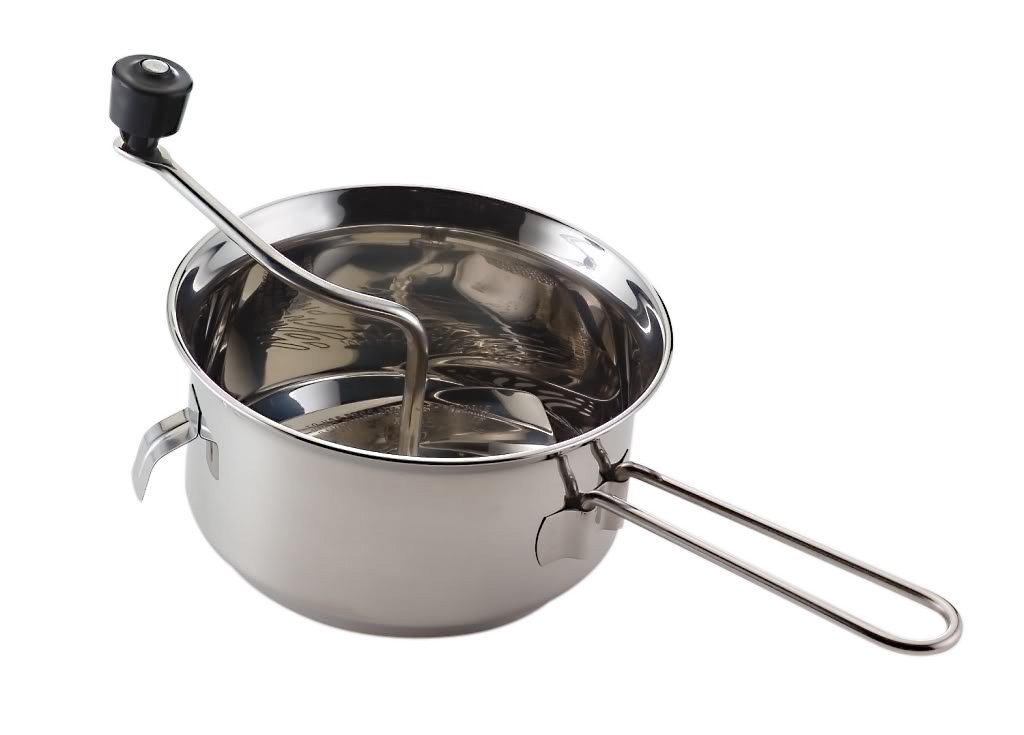
Looks like $35 will get you one from Amazon. It will last a lifetime.
If you don't already have a pot big enough to cover quart jars with water, you might as well buy one of these:
$25 for the canner and rack. You'll never have to buy another one.
Buy a book. This is the Bible of canning:
Don't trust your memory or anybody else's memory for canning times and/or techniques. Spend the $10 and have all the info you need in front of you in the kitchen.
Get reall mason jars. Ball jars are less than a dollar a piece, and they come with lids and bands.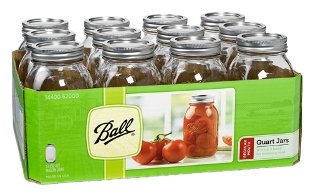
The jars & bands you can use over and over, you'll have to buy new lids every year. We are still using jars that we got from our moms, that they got from their moms. If you are careful, they will last a lifetime.
A jar lifter and a funnel are about the only other things you need. One hundred bucks will put you in the canning business, and you'll never have to buy most of the items again.
Go buy a bushel of tomatos and go at it. If you do juice, it's pretty quick, we boil it down to sauce, so it takes an extra couple of hours for thickening, but the processing into jars is the same. You could do a bushel in an afternoon, from start to finish, and end up with 18 - 24 quarts.
A few days after you are done, you'll forget about the work involved and you'll be eating good food for a year.
Try it, you'll like it.
Tim
-
-
Post #124 - August 19th, 2014, 2:43 pmWhy do you consider canning the sauce to preferable to freezing it? Does it taste better or is it a matter of freezer space?"I live on good soup, not on fine words." -Moliere
-
-
Post #125 - August 19th, 2014, 3:38 pmFP may have a different response but canning is far superior to my taste because the product won't get "burnt" or absorb any off flavors from other things frozen or change consistency or texture when going from frozen to thawed--and I've yet to find any vessel or sealing method that completely avoids those issues. You can save things for MUCH longer. I've had glass jars break in the freezer (no mess, just loss). And, yes, I have much more limited freezer space than closet space. And it is definitely worth the effort to be able to pop open a jar of sauce from your own stock from fresh, delicious tomatoes that went from farm to jar
 "Knowledge is knowing a tomato is a fruit; wisdom is not putting it in a fruit salad." Miles Kington
"Knowledge is knowing a tomato is a fruit; wisdom is not putting it in a fruit salad." Miles Kington
-
-
Post #126 - August 19th, 2014, 9:56 pmEverything that Jen said, plus, it's ready to go with an opener and a flip of the wrist. No thawing involved.
Sometimes, we drink the stuff. If it's too thick, we add a little water. It's nice to just pop a lid and have an instant splash.
When we first feel a cold coming on, you know that first little tingle in your nose and sinuses, we get a glassfull of sauce, add a big tablespoon full of horseradish, and a couple shakes of tabasco sauce. Put in a little pepper, if you like. Do this 3 or 4 times a day. More times than not, it works. I know they say you can't get rid of the virus after it gives you symptoms, but it seems like this works. Plus, it's probably good for you.
Tim
-
-
Post #127 - August 20th, 2014, 7:51 amFreezer Pig wrote:Everything that Jen said, plus, it's ready to go with an opener and a flip of the wrist. No thawing involved.
Sometimes, we drink the stuff. If it's too thick, we add a little water. It's nice to just pop a lid and have an instant splash.
When we first feel a cold coming on, you know that first little tingle in your nose and sinuses, we get a glassfull of sauce, add a big tablespoon full of horseradish, and a couple shakes of tabasco sauce. Put in a little pepper, if you like. Do this 3 or 4 times a day. More times than not, it works. I know they say you can't get rid of the virus after it gives you symptoms, but it seems like this works. Plus, it's probably good for you.
Tim
Sounds like a Bloody Mary to me
-
-
Post #128 - August 21st, 2014, 8:27 ambean wrote:.....Sounds like a Bloody Mary to me.......

We have dabbled in Bloody Mary's. We're not big fans, but we have to try them every year or so, to see if our tastes have changed.
Not much going on outside this week. Garden harvest has slowed. Our late sweet corn actually turned into a crop, after the rains came back. We had a few ears for dinner yestderday and Denise picked a couple dozen last night for the freezer. I'm glad I didn't give up on it, when it was waist high shooting tassels.
The butternut squash are over-producing. We usually give more of these away than what we keep, seems like people really like to get this variety, we are happy to make their day....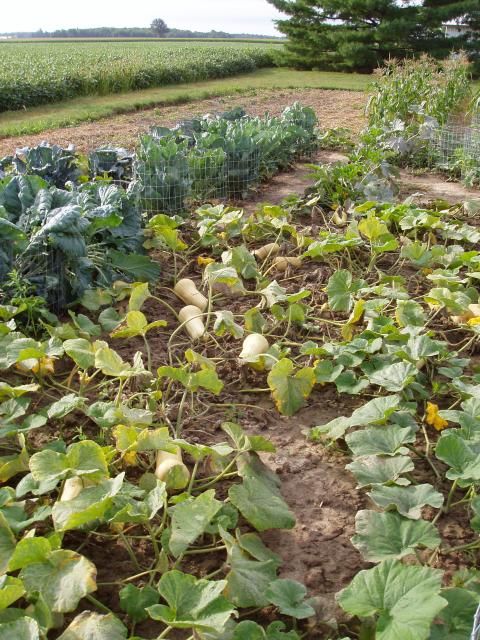
The popcorn is maturing, I think it's at the point where the crop is made. Rain or dry won't have much to do with it anymore, it just needs to dry down so we can pick it. I'm really happy with this, for the first time trying it. We'll probably never have a stand like this again.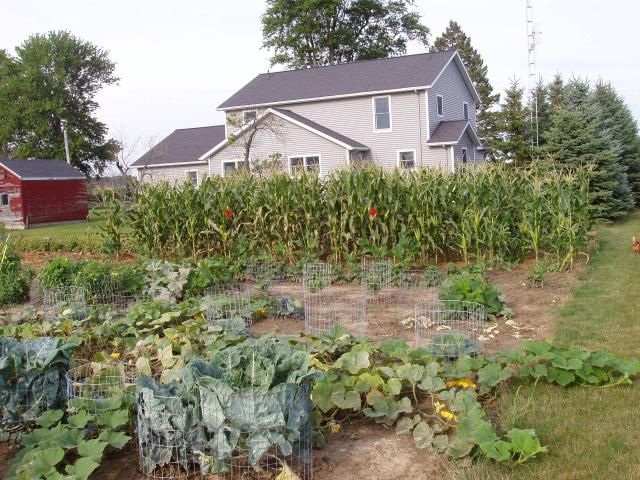
The corn across the road is about the same as the popcorn. It just needs to dry down now and wait for harvest. The view from the barn this morning.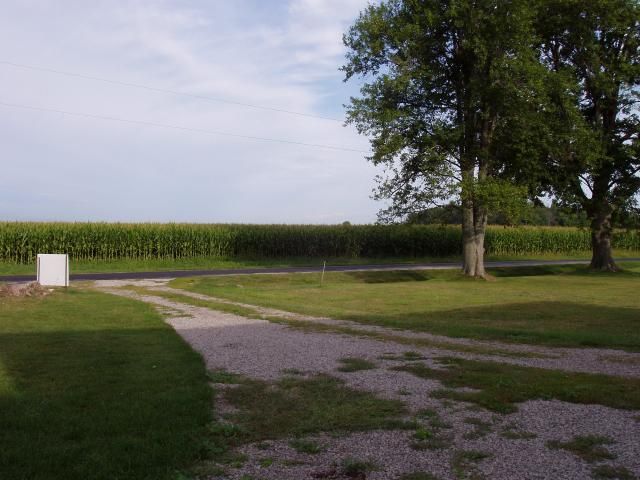
The pigs are enjoying the cooler mornings this week. They got the last of the stalks from the early sweetcorn patch last weekend. Since they went without for a few days, they are really going at it this morning, coming out of the new patch.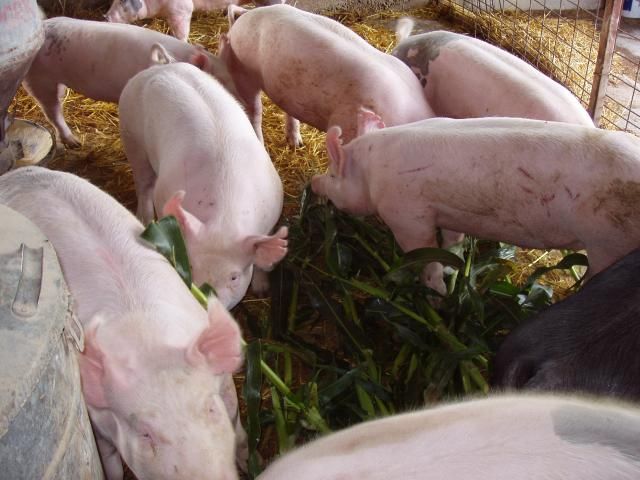
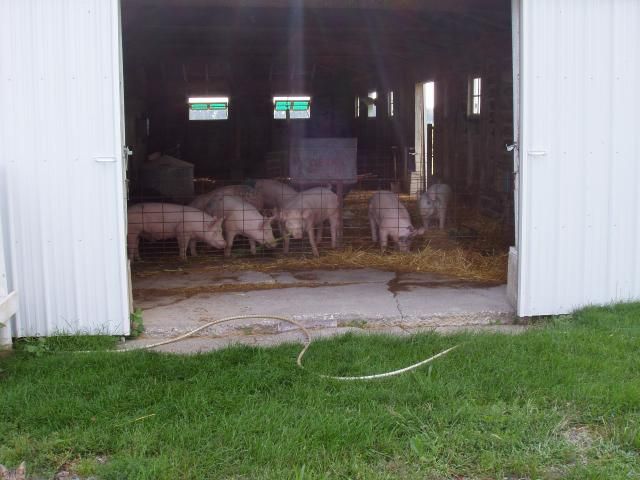
Just a little over two weeks before they are scheduled to go in. Seems like this bunch went fast, but it's the same amount of time as usual.
The soybean field from a different angle, there was a lot of dew this morning and I didn't feel like getting wet, for a picture.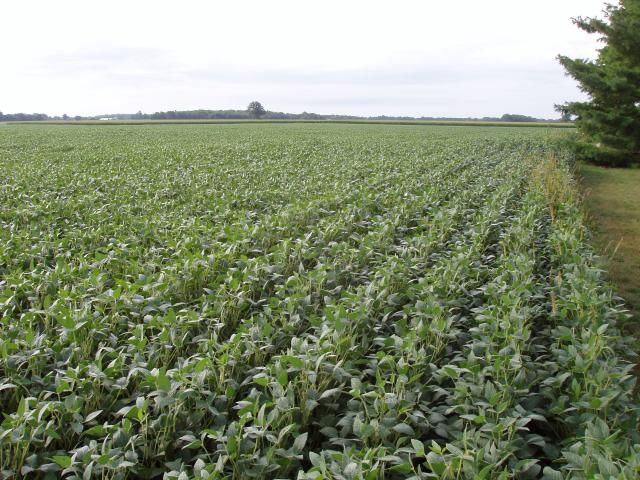
Last picture of the week, this is what 95% accuracy will get you when you buy sexed chicks. We have a rooster mixed in with the last batch.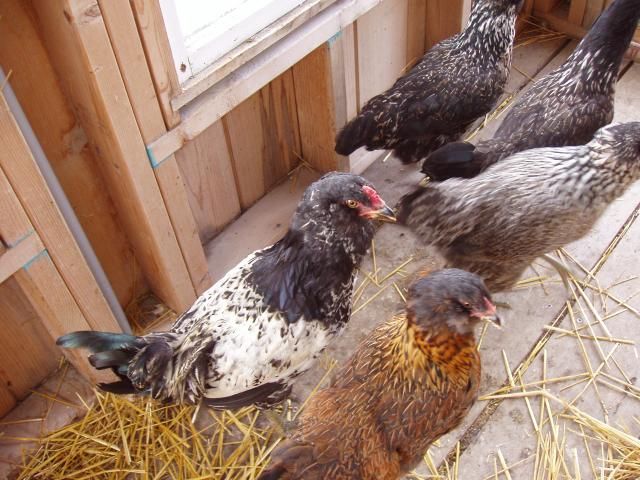
He's the one with the white wings. You can see he has a blue tint to his tail feathers and his comb is a little bigger and redder.
Ever since we got these at a day old, there was one that was a little bigger. When they started getting feathers, one had a little poofier tail than the rest. About ten days ago, I was walking to the house and I heard a cracked crow, coming from out of sight someplace. It sounded like a teenage boy's cracking voice. He is getting better at it, this morning he let out a couple of good ones.
Hens will cackle and make noise, but the sound you hear with chickens, when the sun comes up, in all the movies and TV shows is a rooster crowing, hens don't make that noise.
We don't need fertilized eggs and there is no need for a chicken that will probably end up with a bad disposition around us. He will either go in a pot or we'll sell him at the weekly auction in Hillsdale, MI. We had a friend took a Rhode Island Red rooster up there a couple weeks ago and got $12. That's pretty good money for a live chicken, we may give him a change of scenery, that doesn't involve a light coming on everytime we open the door.
That's it for this week, we are busy with family stuff for the next couple of weeks, so I'm glad the outside things are kind of slow right now.
Tim
-
-
Post #129 - August 21st, 2014, 10:45 pmNot to discount the value of canning, but I too wonder if freezing would be better for me. I have more space available for freezing than for storing jars. It's not clear to me how tomato sauce (for example) in a plastic container would absorb odors from other frozen foods. And if it's in containers taller than they are wide, filled to close to the top, and cooled in the fridge before being frozen, I think the risk of freezer burn could be minimized. A piece of plastic wrap on the top would probably help too. So, does the choice really come down to freezer space versus jar-storing space?"Your swimming suit matches your eyes, you hold your nose before diving, loving you has made me bananas!"
-
-
Post #130 - August 21st, 2014, 11:07 pmKatie wrote:.......So, does the choice really come down to freezer space versus jar-storing space?.....
Storage is actually pretty low on my list. Taste and convenience is the reason we take the time to can (plus, if a disaster knocks your power out for two days, you don't lose all your food). If you open a jar 6 months from now, it'll taste and feel pretty much like it did when you boiled down the fresh tomatos. You'll be able to tell the difference with frozen sauce.
Try a couple of pints or quarts. You probably have a couple of glass mason jars floating around. Go buy a dozen bands and lids, it'll cost you about 5 bucks. Use a couple mayonase jars if that's what you have (Don't do it all the time though, they are too thin to trust). Freeze the same amount. Try it all in the middle of winter and see which you like best.
If frozen works best for you, go for it. At least you'll have the ability to make & store your own food. That's a step in the right direction, especially this far north, where getting snowed in is a pretty regular event......
Tim
-
-
Post #131 - August 27th, 2014, 11:22 pmNo pictures this week, just a long story and a few links if anybody is interested enough to click on them.
We have had a crazy couple of weeks. Between canning and freezing produce, we've had weddings and family reunions.
Our little regional insurance company, that I've been doing business with for 25 years, recently sold to a larger company, on top of that, my agent is in the prcess of retiring, so I've been shopping for a new company/agent. I think we have that settled, after a meeting at the dining room table this afternoon. I think it'll be a good thing to have a new agent and updated policies, but it's been a painful process.
We are also looking at some farmland, coming up for auction this weekend. This has required us to spend time talking to an ag lender and going through our financials. The good news is, they want to lend us more than we want. The bad news is, we are in that position because we don't like to borrow/spend that kind of money, so the land will probably go for more than we are willing to stick our necks out. Oh well, you won't hear me complain about not having a loan payment.
So anyhow, time to learn about FRB. I'll start out by saying, I'm not posting this to pimp anybody into donating money. This is just something we got involved in, that sheds a little light on what goes on outside the city limits.
Food Resource Bank, was actually started by a couple who live right across the field from us. Vernon and Carol are two of the most down to earth people you will ever meet. It's hard to believe they got something, this large, going from scratch. Our church got involved a few years ago, I think we have 5 or 6 crop farmers and our pig project.
This is the way it works, ideally, in a nutshell. People from town donate money to fund a growing project. A farmer will agree to plant a crop (or raise livestock) with the money collected. All the profits from the project will go to FRB, to help in overseas missions. The farmers will donate as much or as little as they choose, sometimes just an acre or two of land, sometimes whole farms. Sometimes, it's just the expertise needed to plant and harvest a crop, but all the profit goes back to FRB.
We add one or two pigs to each batch we feed. When the pigs are processed, we grind the FRB pigs into whole hog sausage and sell it, after church, to get the maximum profits. Church pays for the feeder pig(s), feed and processing. We donate everything else (labor, bedding, transportation, etc).
When FRB sends the money overseas, it's used for education and infrastructure. We just finished a 5 year project in Kenya, that built a reservoir, to catch the spring floods. Then they bought the tools and starter seeds, and educated the local people how to grow their own food. (When I say we, I mean many little FRB growing projects, not just our church's participation).
FRB doesn't buy tractors and equipment, it usually involves hoes and hand tools that don't require large investment to maintain. Once the overseas projects are up and running, the donated money will go to another area to start another project. They always keep track of past projects, to make sure they continue to grow, and to answer any questions that may arise. This isn't a pour money into an area and declare it fixed thing. This is truly a teach a man to fish type thing.
If you have a half hour to kill, watch Vernon tell his story.
One of the things that drew me into this charity, they answered the question of why spend money overseas when there are hungey people in the USA? The answer was, we spend lots of money, in this country to feed our poor, there are a lot of safety nets already in place. Other countries don't have these programs, they need help too. I figured any organization that had the guts to say that, got my support.
So there you go, what we do, to make the world a better place. If you have read along this far, I thank you. The sermon is over. If you ever see this sign on the edge of a field or in front of a barn, you'll know what it's about:
I'll try to get some pictures posted in a day or two, things should start easing up.
Tim
-
-
Post #132 - August 28th, 2014, 8:43 amMy mornings appt/meeting got moved to this afternoon, so I have aspare minute for some pictures. I'm running out of things to snap.
Pigs are growing, but they kind of stalled out in this weeks heat. They are scheduled to go in the 8th, so the barn will be empty in about 10 days.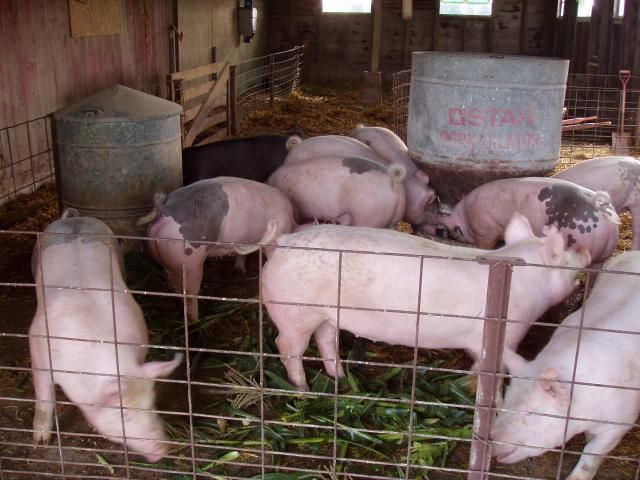
I climbed up to throw down straw. I've talked about the mow, but I don't think I've ever taken pictures.
From the ground;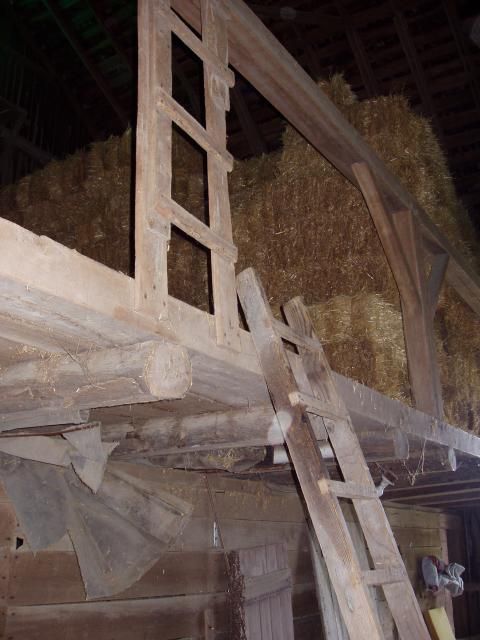
The mow takes up about a third of the main barn space. The old milking area is under it. The gap you see in the top is what I opened up this morning. I just finished up the old stufff we baled 4 years ago. This morning was the first I got from the straw we baled the year before last. I think there is about 600 bales up there, it'll last us a few years, unless we get a lot bigger. As soon as I get about half way through this stack, we'll fill up the other side again. I like to have a couple year cusion on hand, in case of drought or flood, that wipes out the wheat.
A closer view from upstairs, I couldn't get back far enough to get it all in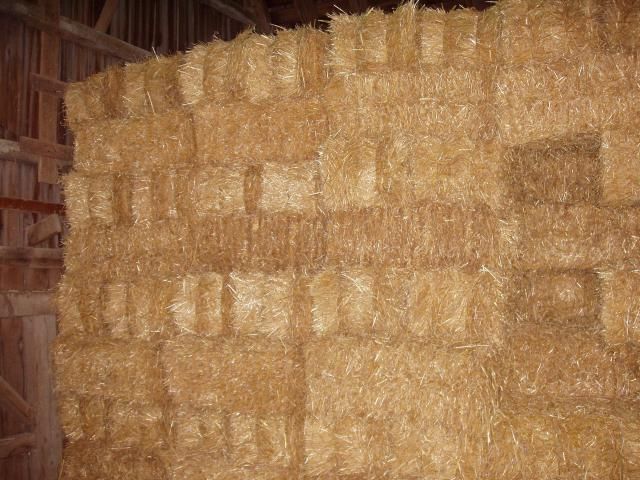
Last summer, I cut a door in the wall, so I could drop the bales right into the aisle of the pig barn. It was an afternoon project that made life so much easier, I don't know why I didn't do it sooner. We used to throw bales down and then carry them through the barn, about 75 feet to where they had to be. No more chaff and loose straw on the main barn floor.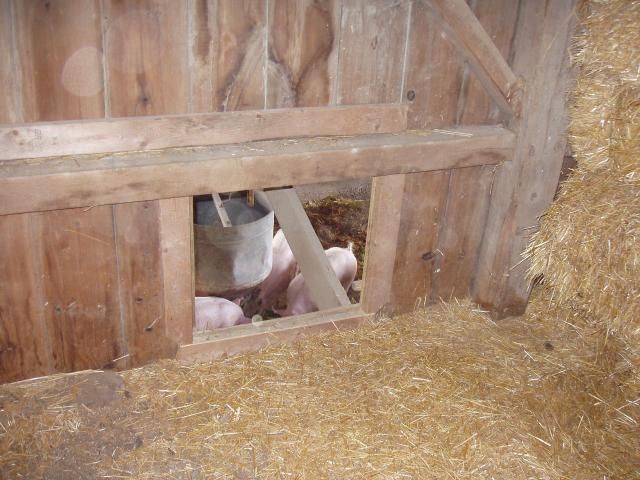
Looking down through the door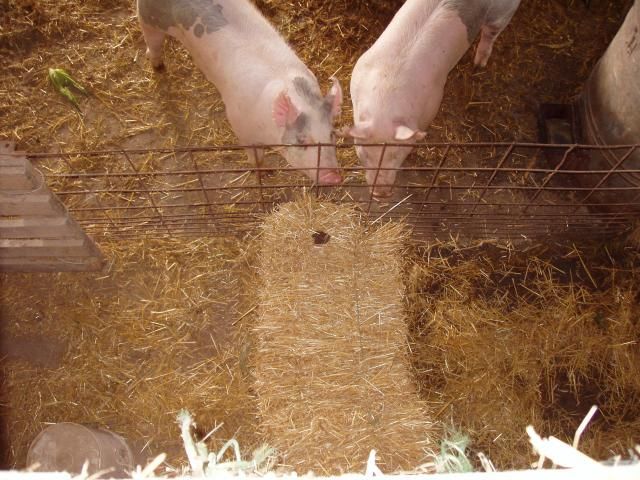
Looking up from the hog barn side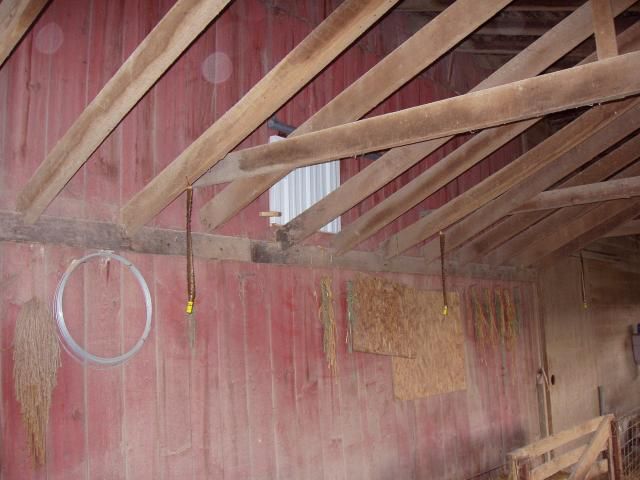
Last picture, I snapped off an ear of pop corn to see how it's doing, it probably won't get picked until the middle of October, and won't dry enough to pop good until about the first of the year. There are plenty a nice ears though, I'm seeing thes wrapped up as Christmas gifts this year.
The kernels will get more shiney as it matures and dries. The phone is for scale, the ear is almost 11" long.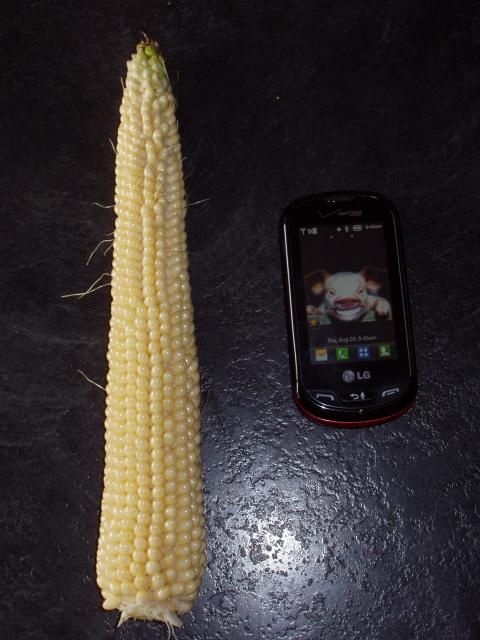
That's it, thanks for looking...
Tim
-
-
Post #133 - August 28th, 2014, 10:03 amCan't wait to (hopefully) take a similar pic!!!
Nice screen shot on your phone "Knowledge is knowing a tomato is a fruit; wisdom is not putting it in a fruit salad." Miles Kington
"Knowledge is knowing a tomato is a fruit; wisdom is not putting it in a fruit salad." Miles Kington
-
-
Post #134 - August 28th, 2014, 10:49 amboudreaulicious wrote:Nice screen shot on your phone

I thought the same thing!-Mary
-
-
Post #135 - August 28th, 2014, 9:59 pmWow, you guys don't miss much!!

That was the first picture message I ever got, when I was first learning to text. It's been my wallpaper ever since.
Glad you noticed, but it wasn't my intention to show it off.
Tim
-
-
Post #136 - September 3rd, 2014, 7:01 amFoggy morning, picture heavy update. We got a half inch of rain yesteray, followed by a cool night, gave us some fog and a heavy dew this morning.
The sun trying to burn through the haze: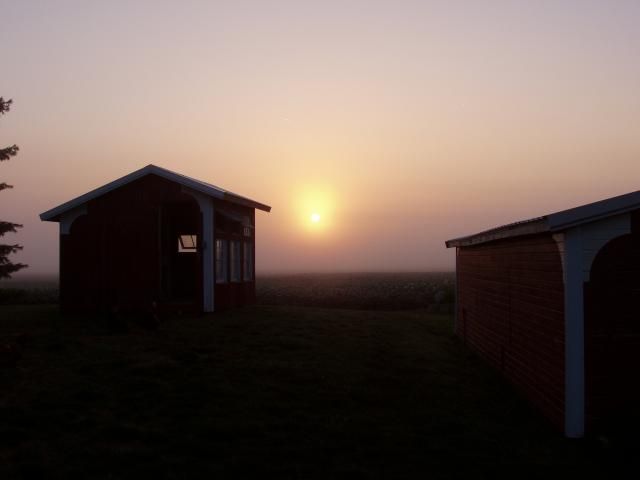
Only two pigs got up this morning, when I walked through the barn, 5 more days before the big trip.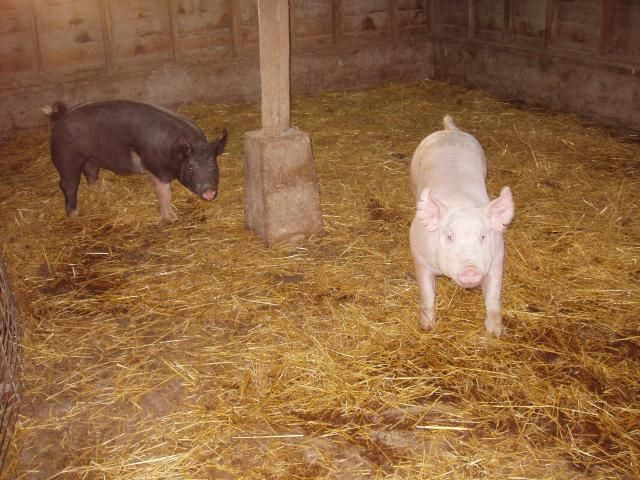
One of the cool things about foggy mornings, this time of year, is the spider webs in the morning sun. I can usually find some great big ones, but since I had the camera this morning, I couldn't locate a really nice one.
These will have to do: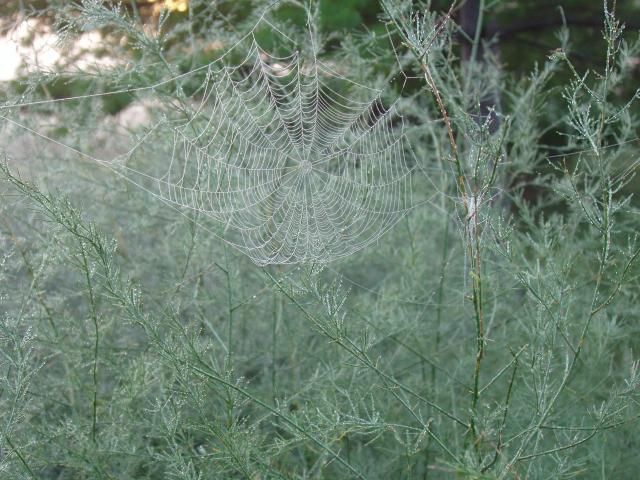
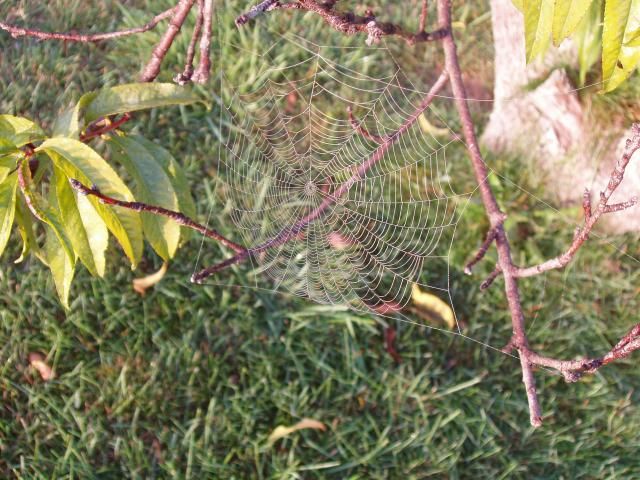
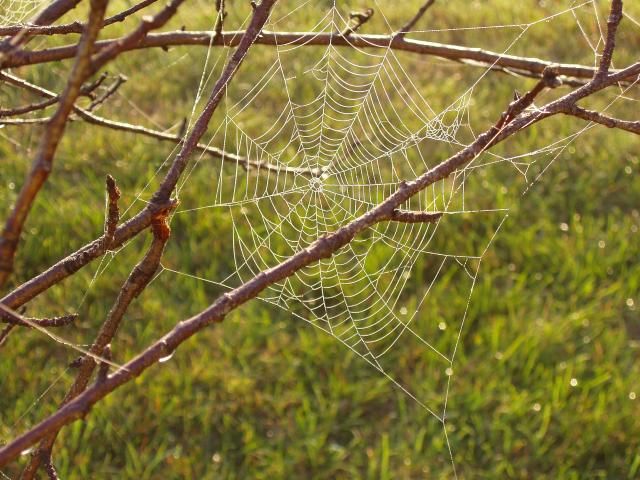
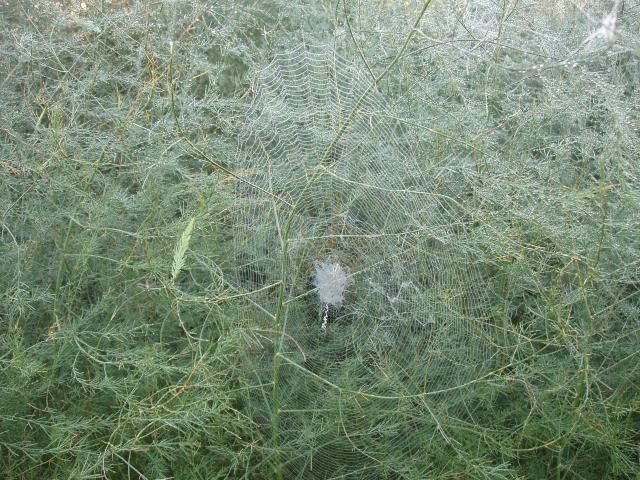
This one has the builder in it: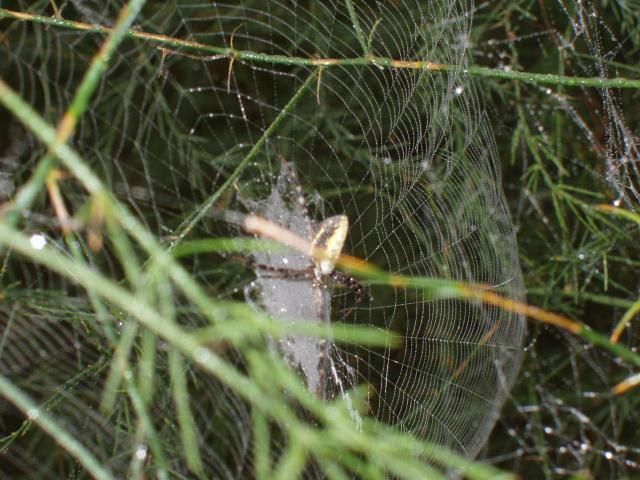
Dew on the soybean leaves: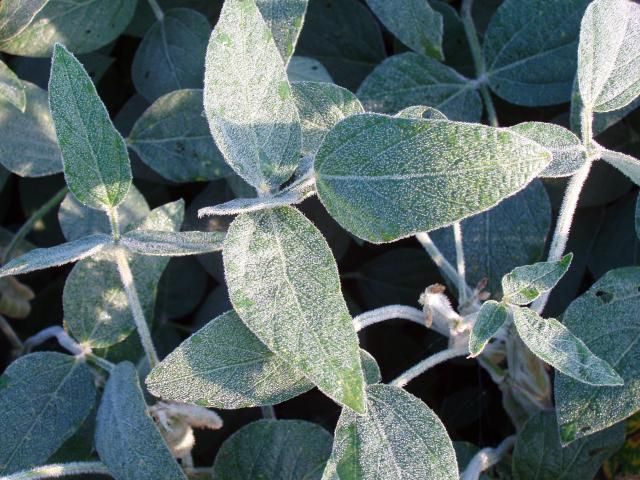
I scurried up the grain bin for a couple of pictures. This is the same bean field you've been watching grow, from a different angle. The view across the field, as the fog burns off: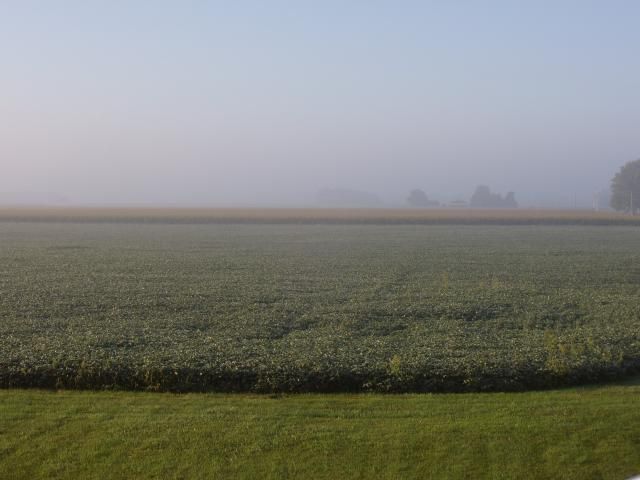
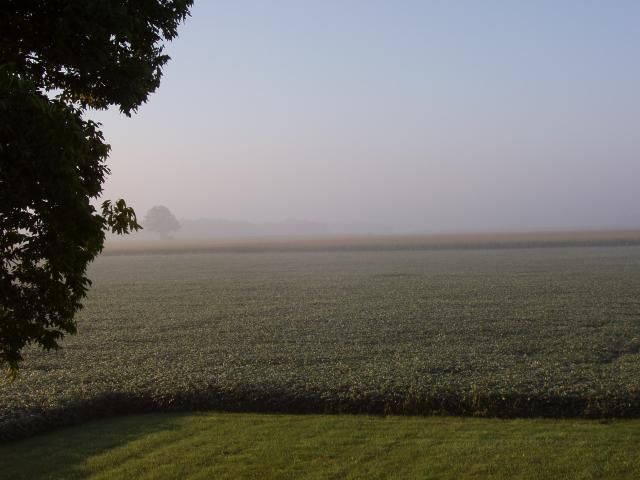
We lost two mature peach trees this year, the winter was just too bitter for them. A third one has about a quarter of the leaves that it should, I don't know if it will make it or not.
Nature seems to know when it has an extreme that results in death. This spring, we had hundreds of peach trees growing from the pits we threw out, on the compost pile, last year. For some reason, a bunch of pits got thrown in a tree stump last summer, the result: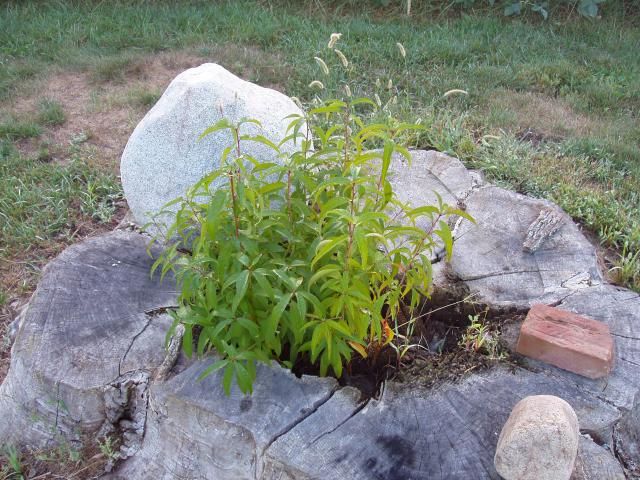
We'll dig these out soon and get them planted where they'll stay. We also have enough to give to anybody, in the neighborhood, that wants a peach tree or two.
I think that's it for this update, I'm out of pictures.
As usual, thanks for playing along.....
Tim
-
-
Post #137 - September 5th, 2014, 9:35 amI finally remembered to grab the camera when I went road farming.
First picture is about a mile north of us. The guy that owns the land is having field tile installed.
This machine has a big plow on the back that pulls the 4" perferated plastic tile 3 feet underground.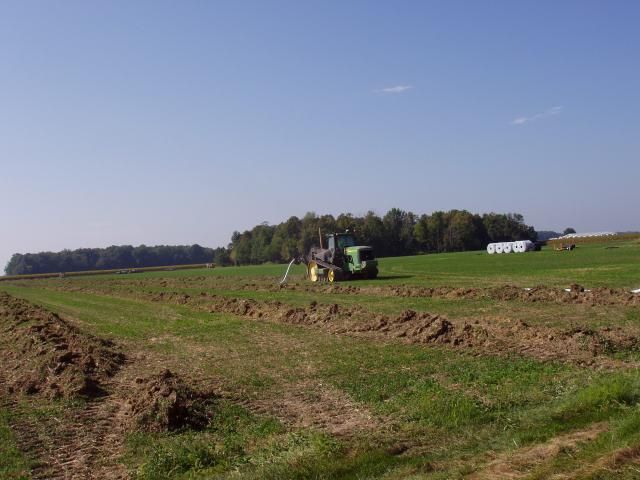
All the lines will slope back to a main cross drain that empties into the deep drainage ditches we have around here. The plow's depth is adjusted with a laser, on the go, so the grade is perfect. The thing sticking up on the back of the plow is the reader, someplace out in the field is a laser, sending out the beam that this follows.
This is what the field looks like after it's done, these will all be settled back in by next spring: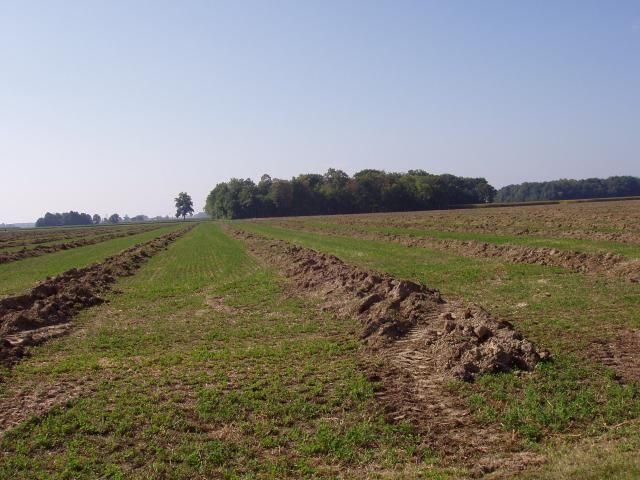
The giant rolls of tile, waiting to be installed: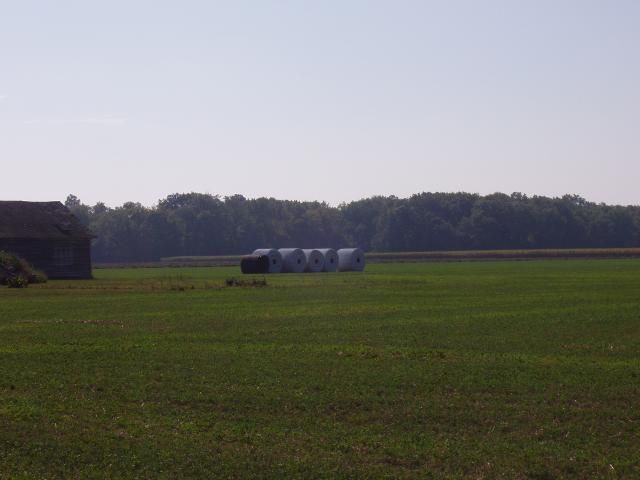
Second cool thing to see this morning..... the neighbor is harvesting tomato's. I'll try to get a better picture later. He was too far down the field for a good shot, and I didn't have time to wait. They travel about the speed of a good walk, so it takes a while to make a round.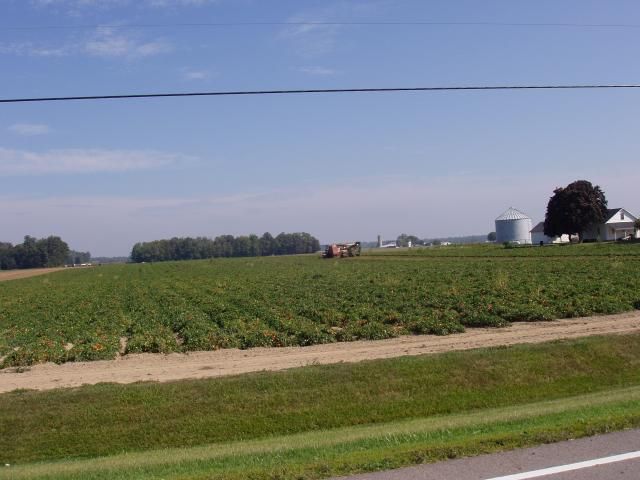
One of the carts, unloading mater's into the semi trailer, that will take them to the processor: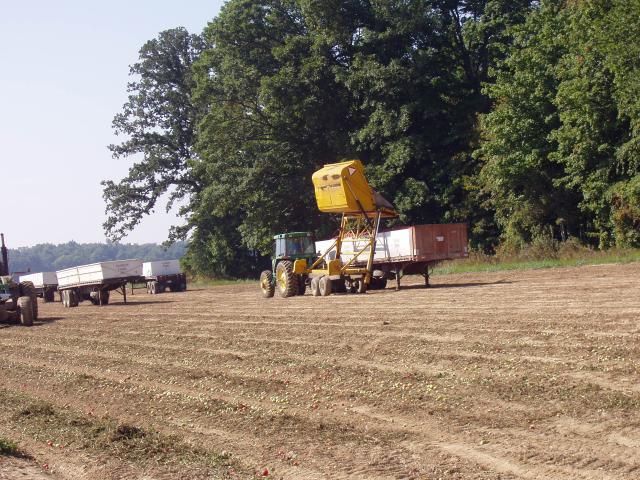
That's it. I'll try to get closer pictures of both machines tomorrow, if I don't get too busy doing other things.
Tim
-
-
Post #138 - September 5th, 2014, 7:56 pmThe tiling of the fields interests me, as this is a high-tech version of a practice that "truck" farms (as veg farms used to be called) have been using for a very long time. I first read about the practice decades ago in, of all places, a 1924 Pulitzer Prize-winning novel called "So Big," by Edna Ferber, which is set in what are now the south suburbs of Chicago, as well as the city itself. Her eye for detail in turn-of-the-century Midwestern agricultural practices was uncanny in its detail. Worth a read this winter.
-
-
Post #139 - September 7th, 2014, 6:40 pmIn South Holland, where I grew up, So Big was required reading in 6th grade. At that time the town was concluding its run as "The Onion Set Capitol of the World.""I live on good soup, not on fine words." -Moliere
-
-
Post #140 - September 7th, 2014, 8:22 pmIn South Holland, where I grew up, So Big was required reading in 6th grade.
Cabbages are beautiful.

-
-
Post #141 - September 8th, 2014, 8:46 amWell, the big day has arrived. Hopefully, if everything goes right, the pigs will be delivered to the processor at 12:30. We Are ready to start loading as soon as the help arrives, probably about 11:30.
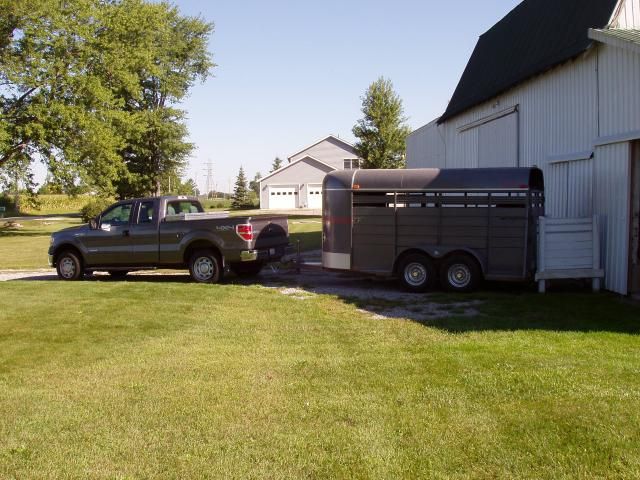
Shooting the breeze with Krazy Kat: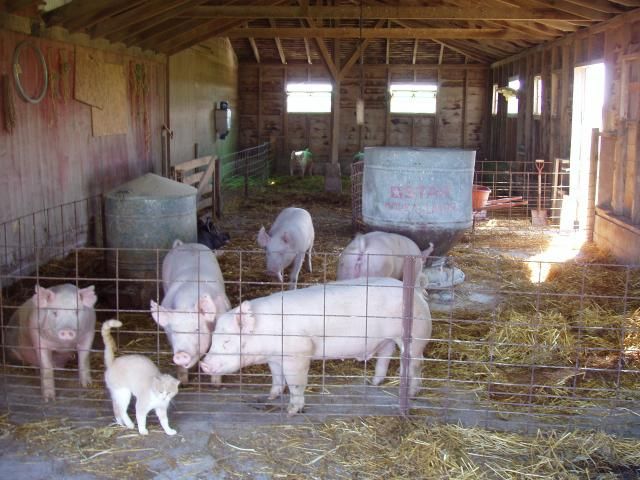
We'll get action shots if we can, but don't count on it, this is a focused operation, once we start loading.
Tim
-
-
Post #142 - September 8th, 2014, 9:01 amsundevilpeg wrote:In South Holland, where I grew up, So Big was required reading in 6th grade.
Cabbages are beautiful.

Nicely done."I live on good soup, not on fine words." -Moliere
-
-
Post #143 - September 9th, 2014, 10:14 amKinda lonesome in the barn this morning......
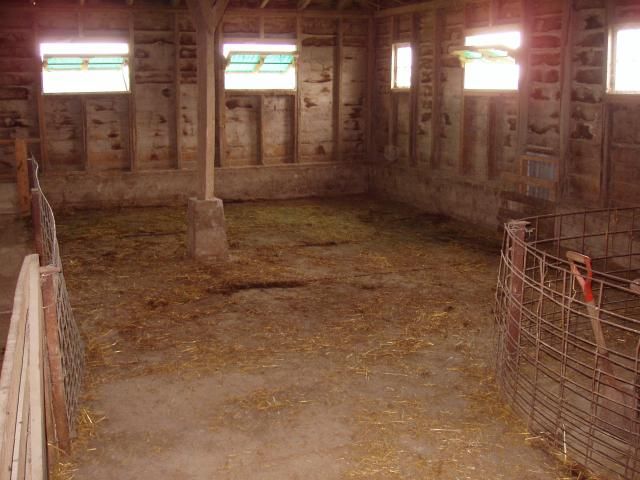
The swallows flew south the weekend before last, pigs loaded out yesterday. Two kittens were the only thing out there this morning.
I went out to clean the barn, last night when I got home, and Denise had already done it. There were about three wheelbarrows full of loose straw, piled up in the aisle, that was all I had to clean. That was a nice surprise.
The feeder needs cleaned out and checked to make sure it's ready to go next time. I'm putting in a new waterline to the barn next week, if everything goes right. Hopefully, that will lead to nicer waterers for the pigs. We've had a few calls for more pigs, I'm trying to decide if I want to feed another batch this fall or work on getting the waterers installed. I have a feed bin and an auger system here, that I took out of another barn. I'd like to eventually get that all set up too. Not having to hump bags of feed over the fence would make my life alot easier too.
I don't know if I'll get anymore done, other than the water line, this fall..... but I know I won't get it done if I put more pigs in.
My feeder pig guy has pigs ready next week, so we have to decide pretty quick what we are going to do.
That's it, not much to see this week.
Tim
-
-
Post #144 - September 9th, 2014, 6:15 pmI went out to clean the barn, last night when I got home, and Denise had already done it. There were about three wheelbarrows full of loose straw, piled up in the aisle, that was all I had to clean. That was a nice surprise.
That, my friend, is love.
-
-
Post #145 - September 12th, 2014, 8:58 amJust a few quick shots this morning. We got 3" of rain Wednesday. The crops are far enough along that it won't help/hurt anymore, but it will be good for the subsoil moisture. This has been a pretty good growing season, but I think we are a little behind on moisture, this will help make it up.
The corn across the road has started drying down. It's hard to believe we are getting this close to harvest time. This field will probably be ready in 6 weeks or so....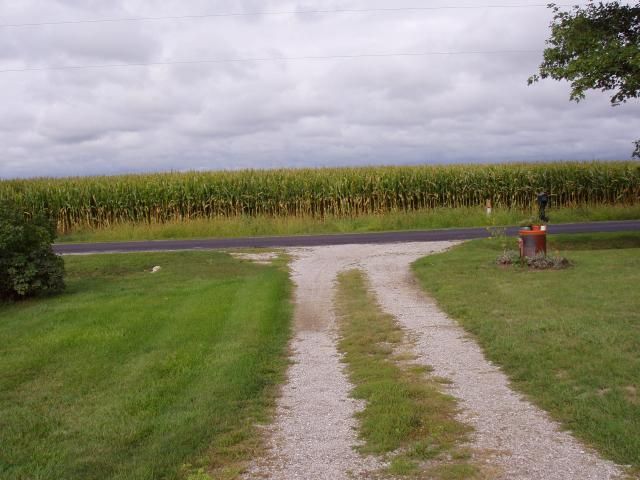
The popcorn in the garden is starting to dry down too. As long as nature cooperates with semi-dry weather, and the stalks don't break over, we'll leave this go for another month or two. It'll dry better outside than inside.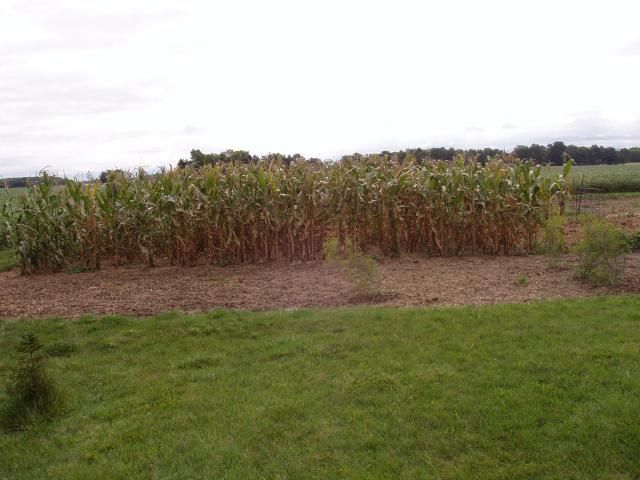
The soybeans in the field are over waist high now, they are all made, they just need dry like the corn. This field probably has 6 weeks to go.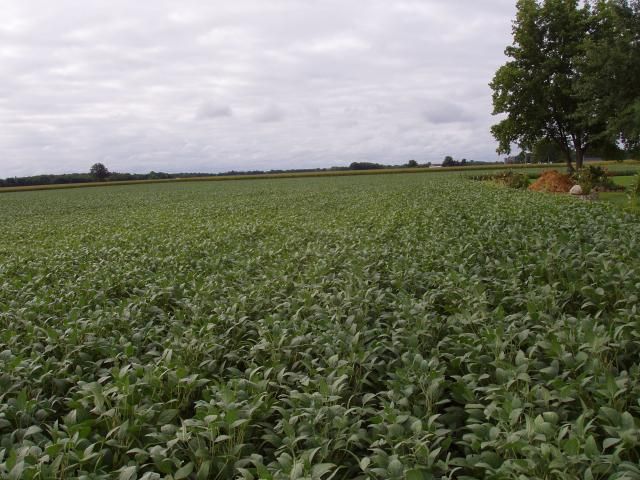
These are full season beans. There are some early varieties in the area, that are dropping leaves already. They'll start harvesting them in another week or two. Early beans are usually planted in fields intended for winter wheat. After the beans are cut, they go in and sow wheat, that will be harvested next summer.
The beans are loaded with pods, from top to bottom. They are talking about record yields, in this area for beans, This is a pretty nice field and there are nicer ones around.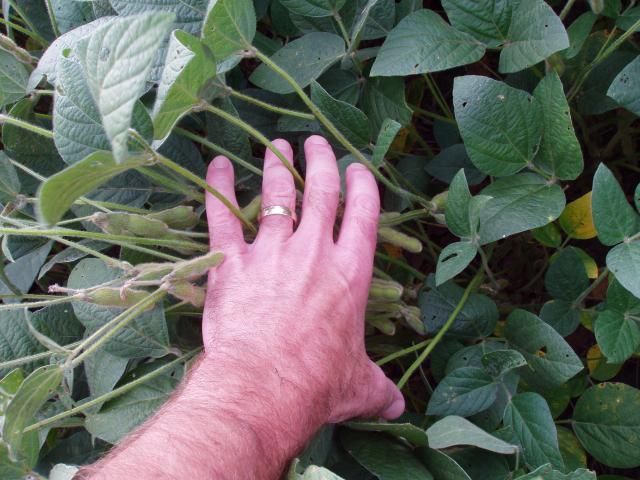
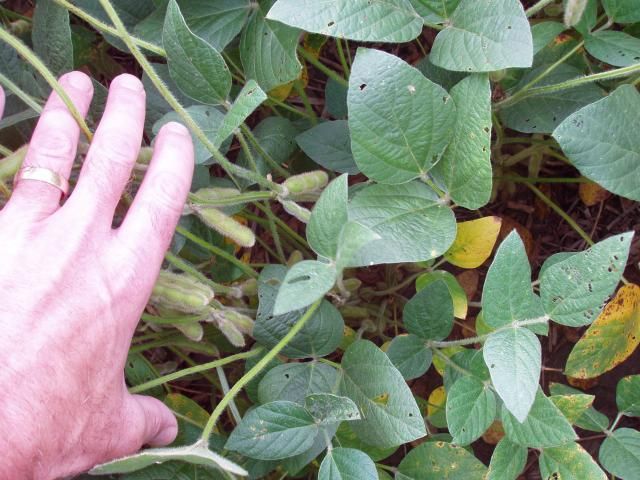
Everybody's hoping for warm, sunny, realatively dry weather from here on out. A few light rains, after wheat is in, will get that sprouted and growing. A late frost is always a plus too, but....... we'll take what we get.
I think that's it, still tossing around putting in pigs this fall.
Thanks for looking,
Tim
-
-
Post #146 - September 14th, 2014, 11:12 pmJust a quick update. Since the questions have been asked about price and amount of space needed for a pig......
This is what a whole processed pig looks like: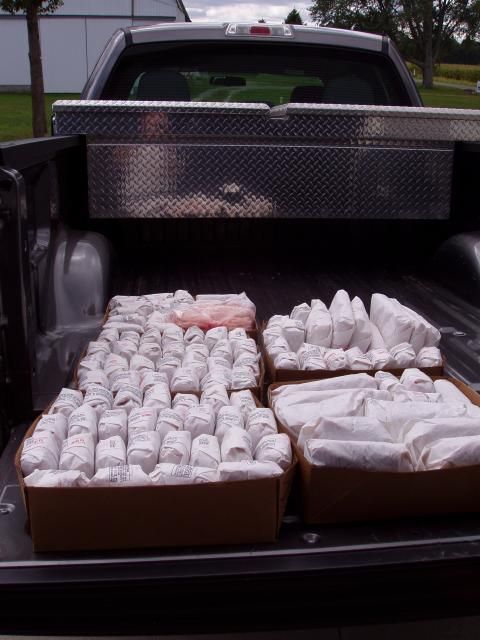
We did half the pig into cuts and the other half into sausage (we sell small amounts of sausage on the side). Those boxes are about 18" square, they hold 27 or 28 one pound packages of sausage, just to give you an idea of size. Obviously, if you got the whole pig in cuts, you'd have less sausage. If you bought a half, you'd have half this amount of pork.
Our pig weighed 192 lbs, hanging weight. That's a little heavier than we like to have them, but I had to schedule these so far out, I just had to hope they'd be right.
We ended up charging $1.31/lb for the pig, so this one would have cost you $251.52. It cost $45 for slaughter, then 50 cents a pound processing, which was $96. 10 cents a pound for seasoning 84 lbs of sausage was $8.40. We cured/smoked the hocks, at 75 cents/ lb for 10.6 lbs came to $7.95.
So processing totaled $157.35 plus the pig $251.52 total came out to $408.87. I'm guessing we had 140 - 150 lbs of cut meat. If we got 145 lbs of actual cuts, that works out to $2.81 / lb total, pig in the freezer.
Not the cheapest ones we ever did, but better than the last couple batches.
Tim
-
-
Post #147 - September 15th, 2014, 2:40 pmOur pig weighed 192 lbs, hanging weight. That's a little heavier than we like to have them, but I had to schedule these so far out, I just had to hope they'd be right.
Hi,
What is the ideal weight?
Do you have them separate out the leaf lard, the fat that wraps around the kidneys? It is a choice fat for making pie crusts.
Thanks!
Regards,Cathy2
"You'll be remembered long after you're dead if you make good gravy, mashed potatoes and biscuits." -- Nathalie Dupree
Facebook, Twitter, Greater Midwest Foodways, Road Food 2012: Podcast
-
-
Post #148 - September 15th, 2014, 9:51 pmCathy2 wrote:.....What is the ideal weight?.........
I'd like to see 165 - 175 lb hanging weight, that puts the pig at 265 - 270 lbs on the hoof, that's the ideal market weight. I guess it's not a big deal, since we aren't gettting docked for having big pigs, which is what would happen on the open market, but it's a matter of pride to sell them at the right weight. I'd rather be too big than too small though.Freezer Pig wrote:....Do you have them separate out the leaf lard.....
Yes we do. If you look in the picture, the front box on the left side has a different colored bundle in it. That's a plastic bag with the leaf fat in it. It's actually the leaf from our pig and the FRB pig we did for church. We still have quite a bit from the last bunch, so we didn't get any extra this time.
The processor offers rendered lard from your pig as one of the options (I don't remember what it costs). Most people don't do it, so the leaf goes in the scrap barrel and they have to pay to get rid of it. We normally get the leaf fat from any of our pigs that the new owners don't want. Since they don't have to render it or pay to get rid of it, the processor just throws it in plastic bags and gives it to us. Everybody wins, it's kind of a perk for bringing them all the business.
We thaw it out when the weather cools, and have an old fashioned lard rendering day, sometime in the winter. Here's the thread, from Lard Fest 2013
Tim
-
-
Post #149 - September 16th, 2014, 2:28 pmHI,
I am glad you keep the leaf lard. I remember long ago, an LTH'r spent considerable time explaining what they wanted to a small pork producer in Iowa. Either the farmer was pulling his leg or he didn't know, though it was great to get the real stuff.
Your ideal weight is that specific to the breed? Sometimes at State Fairs, I see some pretty heft pigs. Are those larger pigs fatter for the competition?
Thanks!
Regards,Cathy2
"You'll be remembered long after you're dead if you make good gravy, mashed potatoes and biscuits." -- Nathalie Dupree
Facebook, Twitter, Greater Midwest Foodways, Road Food 2012: Podcast
-
-
Post #150 - September 16th, 2014, 10:07 pmThe ideal weight is based on what the packers want. The pigs are bred to meet that goal, it's not breed specific.
Packers want uniform sized pigs for two reasons; 1.) The lines are designed and the people are used to processing a certain sized pig. When the carcasses are moving through the plant, they don't want them dragging on the floor or having people stand on their tip toes to reach them. 2.) Consumers expect a certain size pork chop or a pork steak, etc.
Right now, market weight is 265 - 270 lbs live weight. If you want top price, you'll get them to the buyer in that window. Too big or too small and they dock the price you are paid. When I was in high school in the early 80's, market weight was 220-225#. By the time I graduated college int he mid 80's it was 230-235#. by the mid 90's, it was up to 245#. The packers have discovered they can buy more pounds of pork with fewer head to deal with, if they keep raising the weight.
Breeders keep breeding pigs to finish at a larger weight, to meet the processor's specs. Genetically, when modern pigs hit about 280#, they start eating more pounds of feed per pound of gain, instead of making muscle, they are making fat. Financially, this cuts into profits, so you try to hit that window.
Fair pigs run into the same problem I have. Instead of feeding the pigs and selling them when they hit market weight, you are feeding them to hit a specific date. Feed quality, weather, health, everything you can think of affects rate of gain, so it's impossible to guesss that far out and be exact.
Normally for me, I can call a month ahead and get a processing date, this is just a bad time of year right now, I have to schedule them almost as soon as I put them in, if I want them done in September. Our neighboring county fair is the first week of Sept, ours is the second. Anybody that buys a 4H/FFA animal and wants them processed locally, ties up the first two weeks, then there is a bottleneck of people, like me, trying to get their regular livestock worked through.
Like I said, it's not a big deal since we get paid a standard price, it's just a matter of pride to hit market weight.
Hope that all makes sense, if not, point at the confusing part and I'll try to clear it up.
Thanks for asking, it makes me feel better answering questions, and you are helping me deal with my customers, letting me know what they might be thinking.
Tim

